Unlocking Performance in Sow Nutrition
Phytogenics: Potent performance enhancers in sows
Biomin® P.E.P. functions in three ways, i.e. through (1) modifications of the gut microflora, along with (2) a stimulation of digestive secretions and, particularly in sows, (3) a positive impact on feed intake, all in all resulting in improved digestion. An increasing number of trials conducted under experimental and field conditions have shown that inclusion of well-selected phytogenic compounds in diets for sows increases the voluntary feed consumption in the lactation period. Moreover, there is growing evidence that phytogenics have a stabilizing effect on digestion, resulting in improved feed conversion (Kroismayr et al., 2005). Thus, on one hand more feed is ingested; and on the other nutrients and energy are better converted into performance. Consequently, the overall efficiency of production is increased, which is the major aim in view with rising prices for commodities.
Data presented in Figures 1 and 2 were obtained from trials in South and North America. In both trials, sows were fed basal feed either with or without supplemental Biomin® P.E.P. Although there was a dramatic increase in feed intake in both groups during the early lactation period, sows fed phytogenics consistently ingested more feed as compared to the control sows.
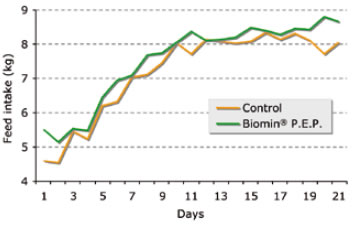
Figure 1 Effect of phytogenics on feed intake of sows in lactation (data from Chile).
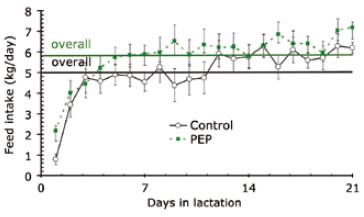
Figure 2 Effect of phytogenics on feed intake of sows in lactation (data from USA).
Positive effects of phytogenics in sow nutrition are usually reflected in increased litter performance. Results from different trial locations are summarized in Figure 3. In these trials, supplementation of diets for sows with Biomin® P.E.P. increased average weaning weight of the piglets by 3 to 9%.
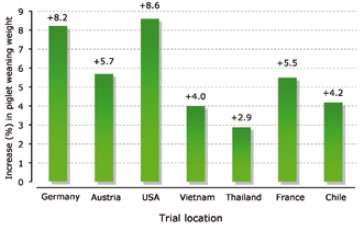
Figure 3 Effect of supplementation of diets for sows with phytogenics on weaning weight of piglets
The latest results from another field trial in Chile (Table 1) confirmed the positive observations that were made in the above mentioned studies.
Table 1. Effects of Biomin® P.E.P. in a field trial with sows (data from Chile)
| Control | Biomin® P.E.P. | Difference | |
| Number of sows | 59 |
56 |
|
| Total litter size | 10.7 |
11.6 |
+ 0.9 (8.4%) |
| Live litter size | 10.6 |
11.3 |
+ 0.7 (6.6%) |
| Average daily feed intake (kg/sow) | 6.41 |
7.05 |
+ 0.64 (9.9%) |
| Body weight of piglets at birth (kg) | 1.41 |
1.44 |
+ 0.03 (2.1%) |
| Body weight of piglets at weaning (kg) | 5.72 |
5.80 |
+ 0.08 (1.4%) |
| Number of weaned piglets per litter | 10.47 |
10.83 |
+ 0.36 (3.4%) |
| Weight of weaned piglets per litter (kg) | 59.88 |
62.81 |
+ 2.93 (4.9%) |
Several investigations have additionally shown substantial reduction in the incidence of diarrhea in piglets. Data from studies carried out in different locations in Vietnam indicate that the mortality of piglets can be dramatically reduced through supplementation of sow diets with Biomin® P.E.P. (Figure 4), even under challenging tropical and humid conditions.
The impressive observations regarding the efficacy of Biomin® P.E.P. in all the trials are further enhanced by a substantial economic advantage. As an example, Table 2 shows the production results from two sow operations located in a high-density swine production area in Hohenlohe, Germany.
Table 2. Effect of Biomin® P.E.P. on profitability in sow production operations (data from Germany)1
| Farm 1 | Farm 2 | |||
Control Groups |
Biomin® P.E.P. Groups |
Control Groups |
Biomin® P.E.P. Groups |
|
| Basic Data | ||||
| Weaning Period | 21 days |
28 days |
||
| Rotations per year | 10 |
8 |
||
| No. of investigated farrowings | 596 |
229 |
256 |
96 |
| Economic analysis: | ||||
| Piglets per litter | 9.6 |
9.9 |
8.9 |
9.7 |
| Weight per piglet (kg) | 6.1 |
6.6 |
8.8 |
9.3 |
| Price per piglet (EUR) | 37.36 |
38.36 |
40.48 |
40.98 |
| Revenue per litter (EUR) | 358.66 |
379.76 |
360.27 |
397.51 |
| Revenue per farrowing place and year (EUR) | 3586.59 |
3797.64 |
2882.18 |
3180.08 |
| Revenue minus cost of Biomin® P.E.P. (EUR) per farrowing place and year | 3586.56 |
3782.64 |
2882.18 |
3165.08 |
| Difference (EUR) per farrowing place and year | 196.08 |
282.90 |
||
| Farrowing places | 78 |
32 |
||
| Difference per farm (EUR) | 15295.24 |
9052.80 |
||
| 1 Data are based on actual prices in Hohenlohe (Germany) and are subject to variation among different countries and at different times. | ||||
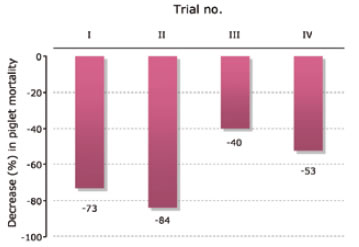
Figure 4 Effect of supplementation of diets for sows with phytogenics on mortality of piglets (data from Vietnam)
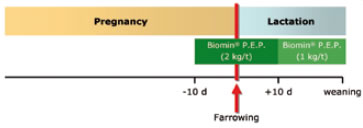
Figure 5 Application of a phytogenic feed additive (Biomin® P.E.P. 1000) in diets for sows
The general recommendation for application of Biomin®P.E.P. is shown in Figure 5. Inclusion of Biomin® P.E.P. 1000 (2 kg/t) from approximately 10 days prior to farrowing until 10 days after farrowing is regarded as optimal period of supplementation under aspects of performance and profitability. Depending on individual farm conditions, dietary supplementation with phytogenics can be carried on with a reduced inclusion rate ( 1 kg/t) until weaning.
A critical review of published literature reveals that a lot of research is needed to further explain the benefits and mode of action of different phytogenic agents. It seems clear that the effects of phytogenics are dose-dependant. Overdosing will most likely constrict feed palatability and result in low feed intakes and depressed growth performance, while insufficient levels of phytogenic agents will remain ineffective. Furthermore, it should be kept in mind that the group of phytogenics is highly inhomogeneous with regard to biological activities and flavoring properties of single active ingredients. Thus, certain mixtures of phytogenic compounds may be more efficient than single compounds. Biomin® P.E.P. has proven highly efficient in sow nutrition, with main benefits regarding feed intake and piglet performance.
Conclusion
As shown in the presented studies with sows, well-selected phytogenic compounds (Biomin® P.E.P.) represent a Natural Growth Promoter (NGPTM) for pigs. Supplementation of diets for sows results in increased body weight of piglets at birth and weaning and improves profitability in sow production operations. A beneficial influence on body condition and fertility is another argument for including Biomin® P.E.P. in rations for sows.
For more information please visit www.biomin.net













 BIOMIN Holding GmbH
BIOMIN Holding GmbH +43 2782 803 0
+43 2782 803 0






